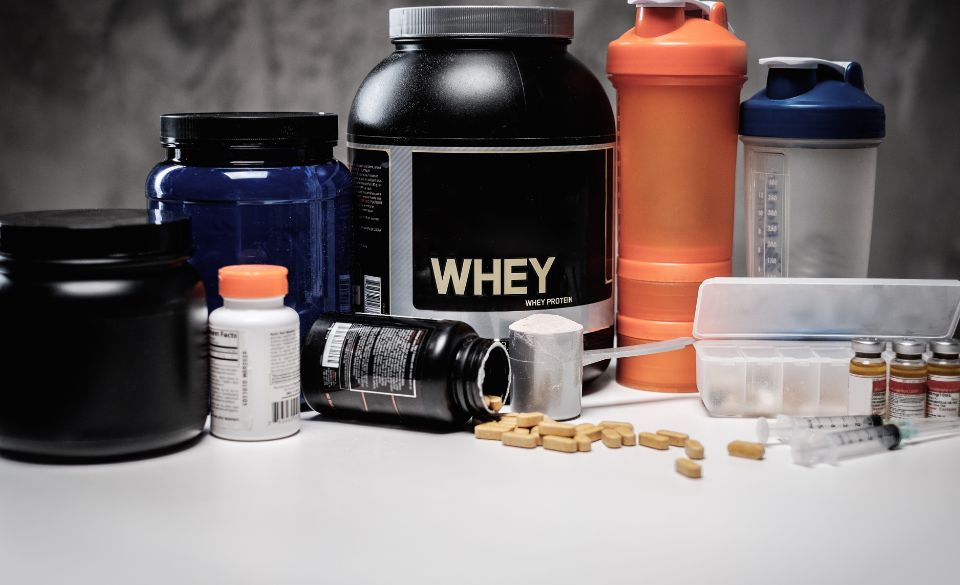
The Role of Supplements in Fitness: What You Need to Know
Page Contents
When it comes to fitness and achieving your health goals, there’s often a lot of buzz surrounding supplements. Walk into any health store, and you’ll be greeted with rows of colorful bottles promising to enhance your performance, aid in recovery, and optimize your results. But what is the role of supplements in fitness, and do you really need them? In this blog post, we’ll explore the world of fitness supplements, discuss their potential benefits, and provide you with the information you need to make informed decisions.
Understanding Supplements: A Tool, Not a Magic Pill
First and foremost, it’s important to understand that supplements are not magic pills that will instantly transform your fitness journey. They are designed to supplement a balanced diet and exercise routine, filling in potential nutrient gaps or supporting specific goals. A solid foundation of healthy eating and regular exercise should always be the primary focus of your fitness efforts.
Supplements can serve as a convenient way to support your fitness goals, but they should never replace whole foods or proper training. They are meant to complement your efforts and provide additional support where needed. Keep in mind that everyone’s needs are different, and what works for one person may not work for another. It’s crucial to listen to your body and consult with a healthcare professional or registered dietitian before incorporating any new supplements into your routine.
Key Supplements for Fitness: What Works and Why
Now, let’s explore some common supplements in the fitness world and their potential benefits. It’s important to note that scientific evidence may vary for different supplements, and individual responses can differ. Here are a few key supplements that have gained popularity in the fitness community:
1. Protein Powder
Protein is an essential nutrient for muscle repair, recovery, and growth. Protein powders, typically made from whey, casein, or plant-based sources, provide a convenient way to increase your protein intake, especially for those who struggle to meet their protein needs through whole foods alone. Protein powders can be beneficial for athletes or individuals with higher protein requirements.
Studies have shown that consuming an adequate amount of protein, whether through whole foods or supplements, can enhance muscle protein synthesis and support muscle recovery. However, it’s important to remember that whole foods should always be the primary source of nutrition, and protein powders should be used as a supplement when necessary.
2. Creatine
Creatine is a naturally occurring compound found in small amounts in meat and fish. It plays a crucial role in energy production, particularly during high-intensity exercise. Creatine supplementation has been shown to enhance strength, power, and muscle mass gains in individuals engaging in resistance training.
Research suggests that creatine supplementation can benefit both experienced athletes and beginners. It may increase the availability of energy for intense workouts, allowing you to push harder and recover faster between sets. However, individual responses to creatine can vary, and it may not be necessary or suitable for everyone.
3. Omega-3 Fatty Acids
Omega-3 fatty acids, particularly eicosapentaenoic acid (EPA) and docosahexaenoic acid (DHA), are essential fats with numerous health benefits. They have anti-inflammatory properties, support heart health, and play a role in brain function.
In the context of fitness, omega-3 supplementation may help reduce exercise-induced inflammation, improve joint health, and support recovery. While it’s ideal to obtain omega-3 fatty acids from fatty fish like salmon or from plant-based sources like flaxseeds, supplements can be a convenient option for individuals who struggle to consume enough through their diet.
Exploring Other Supplements and Considerations
While protein powder, creatine, and omega-3 fatty acids are commonly discussed supplements in the fitness realm, it’s worth noting that there are many other options available. Here are a few more supplements that you may come across:
1. Pre-Workout Supplements
Pre-workout supplements are designed to enhance energy, focus, and performance during exercise. They often contain ingredients like caffeine, beta-alanine, and nitric oxide boosters. While these supplements can provide a temporary energy boost and improved focus, it’s important to be mindful of the potential side effects and individual tolerance to stimulants.
2. Branched-Chain Amino Acids (BCAAs)
BCAAs are a group of essential amino acids, including leucine, isoleucine, and valine. They are often taken as a supplement to support muscle recovery and reduce exercise-induced muscle damage. While research on their effectiveness is mixed, some studies suggest that BCAAs may be beneficial in certain circumstances, such as training in a fasted state or engaging in prolonged endurance exercise.
3. Vitamin and Mineral Supplements
Vitamins and minerals play crucial roles in various physiological processes, including energy production, immune function, and muscle contraction. While it’s generally best to obtain these nutrients from whole foods, certain individuals may benefit from supplementation. For example, individuals with specific dietary restrictions or deficiencies, such as vitamin D or iron deficiencies, may require supplementation under the guidance of a healthcare professional.
4. Individualized Supplements
It’s essential to remember that each person has unique nutritional needs and goals. Depending on factors such as age, gender, health conditions, and exercise intensity, additional supplements may be recommended to address specific deficiencies or optimize performance. This is why seeking professional advice is vital to ensure that you’re making informed decisions that align with your individual circumstances.
Keeping a Balanced Approach
While supplements can be beneficial, it’s important to maintain a balanced approach to your fitness journey. Relying solely on supplements without addressing other aspects of your lifestyle, such as nutrition, hydration, sleep, and stress management, will not yield optimal results. Supplements should be seen as an addition to an already healthy foundation, rather than a replacement for healthy habits.
Remember, the fitness journey is unique for everyone, and what works for one person may not work for another. Prioritize your overall health and well-being, and be mindful of your body’s signals. If you experience any adverse reactions or have concerns, consult with a healthcare professional to ensure you’re making choices that align with your specific needs.
Final Words
Supplements can be a useful tool in supporting your fitness goals, but it’s important to approach them with caution and knowledge
to make informed decisions. Remember, supplements should never replace a well-balanced diet and a consistent exercise routine. They are meant to complement your healthy lifestyle, not serve as a shortcut to success.
Before incorporating any supplements into your fitness regimen, it’s crucial to do your research and consult with a healthcare professional or registered dietitian. They can help assess your specific needs, evaluate potential interactions with medications or existing health conditions, and guide you in choosing the right supplements for your goals.
In addition, keep in mind that supplements are not regulated as strictly as medications by governing bodies. Quality and safety can vary among different brands and products. Look for reputable manufacturers that undergo third-party testing and adhere to good manufacturing practices (GMP) to ensure the quality and purity of their supplements.
Lastly, remember that supplements are just one piece of the puzzle. The foundation of your fitness journey should always be a balanced diet rich in whole foods, regular physical activity, and adequate rest and recovery. Focus on nourishing your body with nutrient-dense foods, hydrating properly, and getting enough sleep to optimize your overall performance and well-being.
In conclusion, the role of supplements in fitness is to provide additional support to your healthy lifestyle, filling in nutrient gaps or supporting specific goals. Protein powder, creatine, and omega-3 fatty acids are a few examples of supplements that have gained popularity in the fitness community. However, it’s important to approach supplements with caution, do thorough research, and consult with professionals before incorporating them into your routine. Remember, supplements are not a magic solution, but when used wisely and in conjunction with proper nutrition and exercise, they can contribute to your overall fitness journey.



